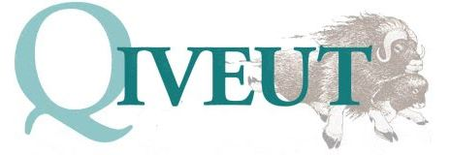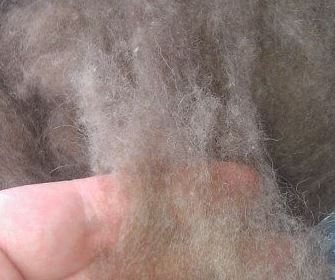About Muskox and Qiviut Fiber
Musk oxen look like an ice aged relic from the past. A male musk ox weighs on average approximately 600 pounds and the female musk ox weighs about 400 pounds. Both male and female muskox have curving horns. Their long hair on the neck, chest and the behind areas can grow to 6 feet in length. This long hair is called guard hair and helps protect the muskox from extreme cold temperatures and wind. The temperature can sometimes go down to 65 degrees below zero. Sometimes the Alaskan Natives refer to them as “the bearded one”

Musk oxen died off within Alaska by the late 1800's and were reintroduced from wild herds found in Greenland during the 1930's. Once in danger of disappearing completely, musk ox populations have made a dramatic comeback with a current worldwide population of about 150,000 animals.
Muskox live in the wild in Alaska, Canada, Greenland, Russia, and Norway for the most part. The musk ox habitat is the tundra and hilly areas. Their cloven shaped hooves are very sharp and expand to give them good traction.
Musk oxen are vegetarians. During the winter, the musk oxen use their horns to break through the ice and packed snow to get to the grass.
Underneath the long guard hair is the fine undercoat of the muskox is called qiviut (kiv-ee-ute) in the Native Alaskan Eskimo language. Each fiber is approximately 11.3 and 17.3 micrometers in diameter*. Females and young animals have the finest wool. Conversely, Cashmere, which is an industry standard for luxury fibers, ranges from 13.6 to 19.2 micrometers*. So, you can see why qiviut is considered one of the softest natural fibers in the world.
Researchers with the University of Alaska have determined that qiviut is stronger and warmer than sheep's wool. It’ also feels softer than cashmere wool and is extremely lightweight.
Qiviut doesn’t shrink in warm or hot water which is quite unique for natural fibers. It also doesn’t have an unpleasant odor when wet like sheep’s wool. Researchers found Muskox fleeces were very low in grease (excreted from the sebaceous gland) and suint (water-soluble, dried sweat from the sweat gland), and also found that contamination with vegetable matter, dirt, and so forth, was minimal. Another beneficial characteristic of the wool is that even when wet it insulates very well.
A common misconception is that musk-ox are part of the Ox family. That’s understandable because “hey! It has ox in its name”. In fact, the muskox is a close relation to sheep and goats, and thought to be most closely related to the Asian Takin or Gnu Goat.



